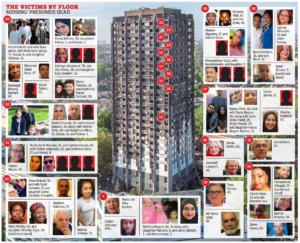The bill for compensating families of those who died in the Grenfell Tower fire in London may be as low as 4 million pounds, according to several lawyers and a Reuters analysis of how damages laws apply in England.
 The blaze engulfed a 24-storey social housing block in west London on June 14, killing an estimated 80 people in the country’s deadliest fire since World War Two.
The blaze engulfed a 24-storey social housing block in west London on June 14, killing an estimated 80 people in the country’s deadliest fire since World War Two.
While similar disasters in the United States have led to massive payouts, any compensation for Grenfell would be far lower because English laws offer less generous damages and don’t allow punitive claims, even if companies are found criminally responsible, said Brett Dixon, president of the Association of Personal Injury Lawyers (APIL).
The four main firms that have been linked to the Grenfell fire – U.S. companies Arconic Inc. and Whirlpool Corp and Britain’s Harley Facades and Rydon Group – declined to comment on the size or calculation of potential payouts.
The Reuters calculation of a bill of 4 million pounds is based on the compensation amounts stipulated in the Fatal Accidents Act of 1976, precedents set in previous cases and the individual circumstances of the 70 victims identified so far.
Three personal injury lawyers have verified the methodology used by Reuters and said the estimate for the total payout is reasonable.
If the courts find there was no unlawful behaviour by any of the companies or public bodies involved, victims will not be entitled to sue for compensation and would only get the financial support and temporary housing already provided by the government and public donations, personal injury lawyers said.
“The British judicial system is not renowned for being generous,” said Rebecca Thomas of law firm Duncan Lewis, which is representing some victims’ families.
“It’s not about money for the families,” said Tim Murphy, whose brother Denis, a disabled former painter who lived on the 14th floor, died in the fire. “Nothing can ease our pain, (but) I think it’s quite insulting.”
The U.S. legal system sees punitive damages as a way of encouraging companies to behave lawfully, but British and European governments have taken the view this approach would put excessive burdens on the judicial system, businesses, insurers and state bodies that might be liable, some legal experts say.
While APIL said the Grenfell Tower disaster demonstrated the inadequacy of payouts to victims, Duncan Fairgrieve, who has advised the UK government on compensation rules, said more generous payouts could also harm society.
They could drive up insurance costs for all and lead to big claims against government bodies such as the National Health Service and the police, he said.
“There is an affordability issue,” said Fairgrieve, a Senior Research Fellow at the British Institute of International and Comparative Law.
If the courts find someone was wrongfully killed, the claim categories are a flat 12,980 pounds per victim for bereavement, costs such as funeral bills, dependency damages where minors or dependent spouses are left behind, and property damage – all to be paid by the party found responsible.
Under the 1976 law, only family members who were supported by those who died can claim dependency damages. Reuters has identified only five people who died leaving dependents who could definitely claim damages – on the basis they were financially dependent on the deceased.
Daniel Machover, a lawyer at Hickman and Rose, which is representing some victims’ families, also said he didn’t expect there to be many claims.
Most of the others who died in the fire were minors, single or elderly and did not leave family members who were financially dependent upon them.
The biggest dependency payout will be for children who lost both parents, said lawyers representing some of the victims.
Kindly follow us on twitter:@AfricanVoice2











